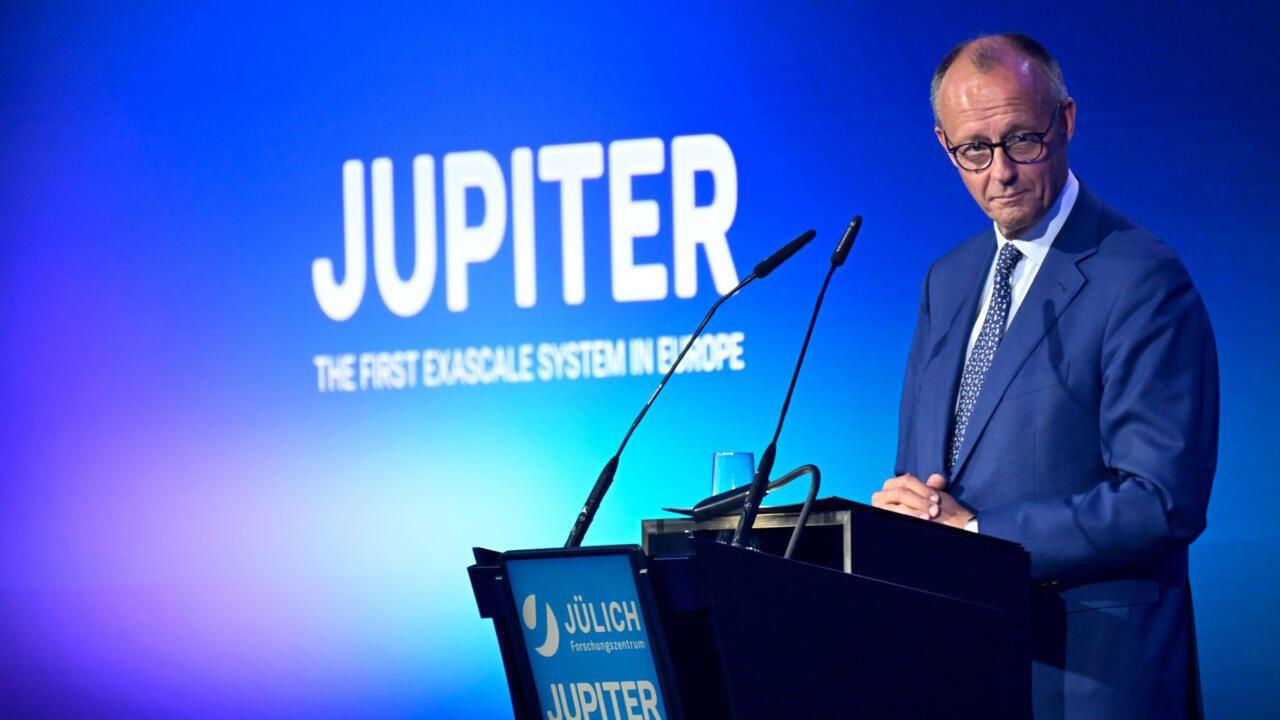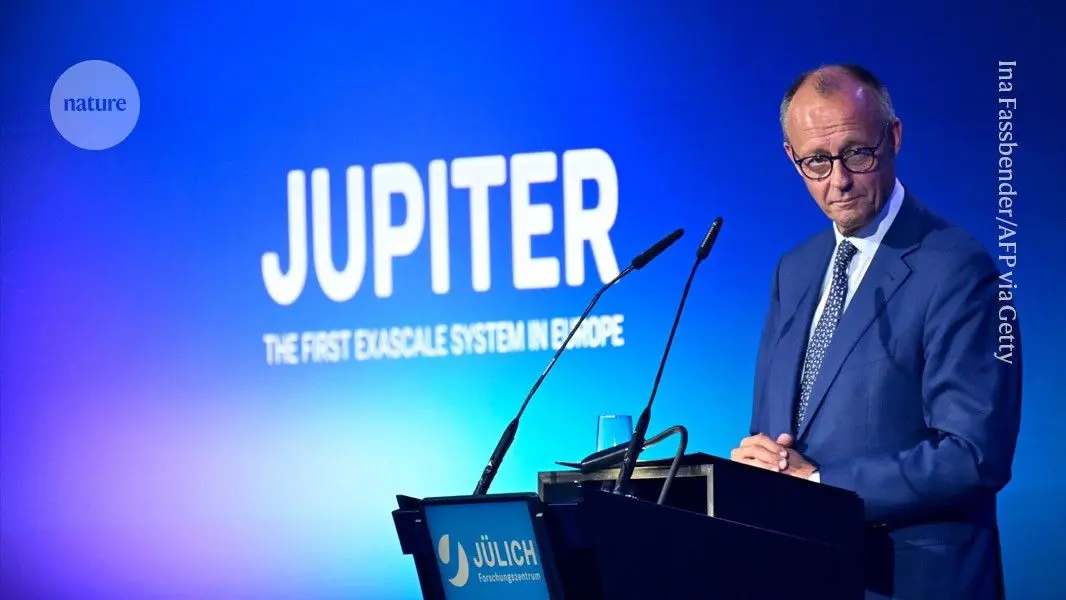Germany Unveils Jupiter: Europe's Fastest AI Supercomputer in Bid to Catch Up with US and China
3 Sources
3 Sources
[1]
Germany's Merz inaugurates Nvidia supercomputer for research
BERLIN, Sept 5 (Reuters) - German Chancellor Friedrich Merz inaugurated a supercomputer powered by Nvidia (NVDA.O), opens new tab chips on Friday that is the world's fourth-fastest, saying it helps Europe catch up with the leaders in AI, the United States and China. "We are today witnessing a historic European pioneering project," Merz said at the Juelich research centre in western Germany, the site of the installation of the Jupiter supercomputer, which was also assembled by French IT group Atos (ATOS.PA), opens new tab and German modular supercomputing company ParTec (JY0n.DE), opens new tab. He said the U.S. and China were leading the race towards an AI-driven economy, but "we in Germany and in Europe have all the opportunities to catch up and then to hold our own". The start of Jupiter's operations marks the first European supercomputer of the Exascale class, mastering one billion times one billion calculations per second, also making it the region's fastest. That amounts to the power of about 10 million standard notebook computers. European institutions are aiming to stay competitive against the U.S. in supercomputers, used in scientific fields from biotechnology to climate research, seeking to avoid over-reliance on digital services from overseas. Jupiter "will put Germany at the forefront of global high-performance computing and improve the conditions for the development of AI," said Ralf Wintergerst, head of digital business association Bitkom, adding that access to it should be made as unbureaucratic as possible for start-ups and established companies. Reporting by Andreas Rinke; Writing by Friederike Heine and Ludwig Burger; Editing by Alex Richardson Our Standards: The Thomson Reuters Trust Principles., opens new tab
[2]
Merz inaugurates supercomputer, says Europe can catch up in AI race
Jülich (Germany) (AFP) - German Chancellor Friedrich Merz said on Friday that Europe can catch up in the global artificial intelligence race as he inaugurated the continent's fastest supercomputer. "The United States and China are in a neck-and-neck race to compete for future market share in an AI-supported global economy," he said at the inauguration of the Jupiter computer, which will be able to perform at least one quintillion (or one billion billion) calculations per second. "We in Germany, and we in Europe, have every opportunity to catch up and then keep pace." Jupiter, based in Juelich, western Germany, is housed in a centre about half the size of a football pitch and is packed with about 24,000 Nvidia chips, which are favoured by the AI industry. With the power of about one million smartphones, experts say it is the first supercomputer that can be considered internationally competitive in training AI models in Europe. "In Germany and in Europe as a whole, we need sovereign computing capacities that are on a par with our international competitors," Merz said. "This is a question of competitiveness as well as the security of our country." Researchers across numerous different fields will be able to access the 500-million-euro ($580-million) supercomputer, whose uses go far beyond AI. They range from creating more detailed climate forecasts that can help predict extreme weather events to medical research and studies related to the energy transition.
[3]
Merz inaugurates supercomputer, says Europe can catch up in AI race - The Economic Times
German Chancellor Friedrich Merz said on Friday that Europe can catch up in the global artificial intelligence race as he inaugurated the continent's fastest supercomputer. "The United States and China are in a neck-and-neck race to compete for future market share in an AI-supported global economy," he said at the inauguration of the Jupiter computer, which will be able to perform at least one quintillion (or one billion billion) calculations per second. "We in Germany, and we in Europe, have every opportunity to catch up and then keep pace." Jupiter, based in Juelich, western Germany, is housed in a centre about half the size of a football pitch and is packed with about 24,000 Nvidia chips, which are favoured by the AI industry. With the power of about one million smartphones, experts say it is the first supercomputer that can be considered internationally competitive in training AI models in Europe. "In Germany and in Europe as a whole, we need sovereign computing capacities that are on a par with our international competitors," Merz said. "This is a question of competitiveness as well as the security of our country." Researchers across numerous different fields will be able to access the 500-million-euro ($580-million) supercomputer, whose uses go far beyond AI. They range from creating more detailed climate forecasts that can help predict extreme weather events to medical research and studies related to the energy transition.
Share
Share
Copy Link
German Chancellor Friedrich Merz inaugurates Jupiter, Europe's fastest supercomputer, at the Juelich research centre. The Nvidia-powered system aims to boost Europe's competitiveness in AI and high-performance computing.
Europe's AI Ambitions: Jupiter Supercomputer Unveiled
In a significant move to bolster Europe's position in the global artificial intelligence (AI) race, German Chancellor Friedrich Merz inaugurated the Jupiter supercomputer at the Juelich research centre in western Germany. This powerful machine, hailed as the world's fourth-fastest supercomputer, marks a crucial step in Europe's efforts to compete with AI leaders like the United States and China
1
2
.
Source: France 24
Technical Specifications and Capabilities
Jupiter represents a milestone in European computing power, being the first supercomputer of the Exascale class in the region. It boasts the ability to perform at least one quintillion (one billion billion) calculations per second, equivalent to the computing power of about 10 million standard notebook computers or one million smartphones
1
3
.The supercomputer is housed in a facility about half the size of a football pitch and is equipped with approximately 24,000 Nvidia chips, which are widely favored in the AI industry. This impressive hardware configuration makes Jupiter the fastest supercomputer in Europe and positions it as a formidable tool for training AI models
2
.Collaborative European Effort
The Jupiter project is a result of collaboration between multiple European entities. While powered by Nvidia chips, the system was also assembled with contributions from French IT group Atos and German modular supercomputing company ParTec. This joint effort underscores Europe's commitment to developing sovereign computing capabilities
1
.Applications and Research Potential
Chancellor Merz emphasized the broad range of applications for Jupiter, extending far beyond AI:
- Climate Research: Creating more detailed climate forecasts to predict extreme weather events.
- Medical Research: Advancing studies in biotechnology and healthcare.
- Energy Transition: Supporting research related to sustainable energy solutions
2
3
.
The 500-million-euro ($580-million) investment in Jupiter aims to provide researchers across various fields with access to cutting-edge computing power, enhancing Europe's research capabilities and competitiveness
3
.Related Stories
Europe's Strategic Position in AI and Computing

Source: Reuters
Merz framed the inauguration of Jupiter as a "historic European pioneering project," highlighting its importance in Europe's technological landscape. He stated, "We in Germany and in Europe have all the opportunities to catch up and then to hold our own" in the AI-driven economy race
1
.The chancellor also emphasized the strategic importance of sovereign computing capacities, viewing it as crucial for both economic competitiveness and national security. This sentiment was echoed by Ralf Wintergerst, head of digital business association Bitkom, who called for unbureaucratic access to Jupiter for startups and established companies alike
1
2
.Global Context and Competition
The unveiling of Jupiter comes at a time when the United States and China are perceived to be leading in the development of AI technologies. Merz described their competition as a "neck-and-neck race" for future market share in an AI-supported global economy
2
.
Source: ET
By inaugurating Jupiter, Europe aims to reduce its reliance on digital services from overseas and establish itself as a key player in high-performance computing and AI development. This move is seen as critical for maintaining technological sovereignty and fostering innovation within the European Union
1
3
.References
Summarized by
Navi
Related Stories
JUPITER: Europe's First Exascale Supercomputer Ignites AI and Scientific Research
06 Sept 2025•Technology

Jupiter Supercomputer Takes Europe's HPC Crown, Poised for Exascale Performance
10 Jun 2025•Technology

Germany Opens €1 Billion AI Data Center to Boost Digital Sovereignty and Industrial AI
04 Feb 2026•Technology

Recent Highlights
1
OpenAI secures $110 billion funding round from Amazon, Nvidia, and SoftBank at $730B valuation
Business and Economy

2
Anthropic stands firm against Pentagon's demand for unrestricted military AI access
Policy and Regulation

3
Pentagon Clashes With AI Firms Over Autonomous Weapons and Mass Surveillance Red Lines
Policy and Regulation





